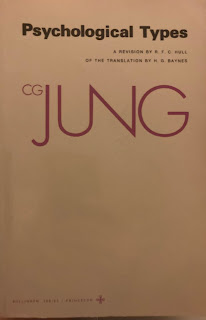The books are here!
I don't read paper books much anymore, so it is special that I got two of C.G. Jung's books delivered yesterday (the word that price tag is partly covering up is "Memories"):
"Indeed, even in medical circles the opinion has got about that my method of treatment consists in fitting patients into this system and giving them corresponding 'advice'. This regrettable misunderstanding completely ignores the fact that this kind of classification is nothing but a childish parlour game, every bit as futile as the division of mankind into brachycephalics and dolichocephalics. [Joel note: he clearly is not impressed by phrenology.] My typology is far rather a critical apparatus serving to sort out and organize the welter of empirical material, but not in any sense to stick labels on people at first sight. It is not a physiognomy and not an anthropological system, but a critical psychology dealing with the organization and delimitation of psychic processes that can be shown to be typical."
But if the reader will indulge me, I'd like to share something from the website that was my "first love" in the Jungian typology community. Revel in the dowdy HTML of PersonalityPage.com, where I first learned of the 16 types, sometime in 2012 or so. Little did I know, as I was reading the following line from the page of advice to ISFPs, that I myself was an ISFP (ESI / ISFj in Socionics):
"Try to identify the personality type of everyone that you come into contact with for any length of time."
Not long after I absorbed this writer's material on the 16 types in the MBTI, I began unwittingly following that bit of advice, while utterly convinced that I was an ENTJ (which happens to be the "dual" of ISFP in the Socionics model). Paying close attention to the physical cues that go with personality is a way of making up for the handicap of the ISFP, which is awareness so intense of one's own values and opinions about reality, that it is easy at best to simply ignore deviations from that awareness out in the general population, and at worst to condemn them.
So I give myself a dispensation, of sorts, from Jung's admonition against labeling. In my case, the sorting process and the provisional labeling of a new person I encounter, helps me to successfully interact with the person going forward. Having engaged in this analytical process makes me more mindful than I would otherwise be, that difficulties in communication are more likely due to their different personality, than to defects in their morals and/or intelligence.
My problem has long been a temptation-- which I succumb to less and less as time goes on, but which I still succumb to sometimes-- to verbalize that analytical process, without being overly concerned about whether or not the listener can participate meaningfully.
Anyway- Jung discovered how hard it was to explain his abstractions about "typical behavior". Aushra combined his thoughts with the theory of Information Metabolism, and many diagrams ensued over the years.


Comments
Post a Comment